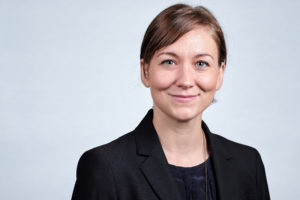 Jennifer Apell is an Assistant Professor of Environmental Engineering in the Department of Civil and Urban Engineering at NYU. She earned her PhD in Environmental Chemistry from MIT in 2017 and completed her postdoctoral research at ETH Zurich in the Department of Environmental Systems Science. Her research focuses on the environmental fate of manmade organic pollutants, specifically characterizing the mechanisms that control the equilibrium and kinetics of partitioning between environmental media and on light-driven degradation pathways.
Jennifer Apell is an Assistant Professor of Environmental Engineering in the Department of Civil and Urban Engineering at NYU. She earned her PhD in Environmental Chemistry from MIT in 2017 and completed her postdoctoral research at ETH Zurich in the Department of Environmental Systems Science. Her research focuses on the environmental fate of manmade organic pollutants, specifically characterizing the mechanisms that control the equilibrium and kinetics of partitioning between environmental media and on light-driven degradation pathways.
Read Jennifer Apell’s Emerging Investigator Series article “quantifying the impact of cloud cover on solar irradiance and environmental photodegradation” and read more about her in the interview below:
Your recent Emerging Investigator Series paper focuses on Quantifying the Impact of Cloud Cover on Solar Irradiance and Environmental Photodegradation. How has your research evolved from your first article to this most recent article?
If you put this article next to the very first one I published during my master’s degree, you would probably be surprised they were from the same person. My first research was in water treatment engineering and focused on bench-scale testing of an ion exchange treatment processes for a small utility in Florida. This article uses machine learning models and publicly available data from the National Renewable Energy Laboratory (NREL).
Make no mistake, I am still an experimentalist, but the COVID-19 pandemic required a lot of adaptation from early career faculty. There was some precedent for this work as it builds off some of my postdoctoral research on modeling clear sky irradiance spectra to quantify “best-case scenario” photodegradation rates. This new research tries to make those values more realistic by considering the effects of clouds. With the messiness of real world data, machine learning models proved to be a powerful tool to find overall trends hidden within tens of thousands of data points.
What aspect of your work are you most excited about at the moment?
Learning some data science approaches during the lockdown was fun. However, many of these approaches are most useful for large datasets, which are pretty rare for the research I normally work on. I’m now looking forward to learning how advances in data science can be applied to analyze the sparse data sets that are typical when investigating the environmental fate of manmade chemicals.
I have also been focusing on having environmental justice concerns and community engagement guide and inform the research questions I address. New York City might be one of the best places for this. It is a new area for me, and the interest and engagement from the community that I have experienced so far is truly inspiring.
In your opinion, what are the most important questions to be asked/answered in this field of research?
That is a difficult question; there are so many questions that still need to be answered about pressing environmental concerns. Instead I would suggest that in our attempts to answer these questions, we give extra consideration to understanding the mechanisms—the ‘why?’—of the process. There are just too many chemicals and too many human-impacted environments for us to be investigating them on a case-by-case basis. Although our research may be focusing on a single pollutant or a single location, we should always try to put our results in a broader context so that the insights gained from our efforts can be translated to other situations.
What do you find most challenging about your research?
There are still so many things we don’t know about environmental processes and the impact that humans have on different environments. I’ve struggled with focusing on just a few research questions now that I have the freedom of a principal investigator. I find so much of the research in the field to be very exciting and important. I have a sign in my office that reminds me to stay focused on my currently chosen research questions.
In which upcoming conferences or events may our readers meet you?
I am co-organizing the Aquatic Photochemistry session at ACS this spring in San Diego. It looks like it is going to be amazing – so many good talks! I will unfortunately have to attend virtually. I’m also hoping to make it to AEESP and the Gordon Research Conference on Environmental Sciences: Water during the summer.
How do you spend your spare time?
My dog, Lumen, and I spend some time in the dog park, and I try to keep plants alive with varying success. I like to take the extra time to walk to places to get to know the neighborhood. I occasionally volunteer as a participant in other people’s research. I’ve been doing this since graduate school. Social science studies are particularly interesting because the research questions have always been hush-hush, so the tasks seem very random sometimes.
Which profession would you choose if you were not a scientist?
Well I was a practicing engineer for a while before returning to school for a PhD. But let’s say if I weren’t any kind of scientist or engineer, I think I would want to be a detective. The use of reasoning and the long time required for something to be concluded seems like it would be similar between the two professions.
Can you share one piece of career-related advice or wisdom with other early career scientists?
Work on research questions that excite you. Equipment failure and inconclusive results are generally unavoidable, and being excited to answer the question can help get you through those hard times to the much happier times of contributing new data and knowledge to the field.










